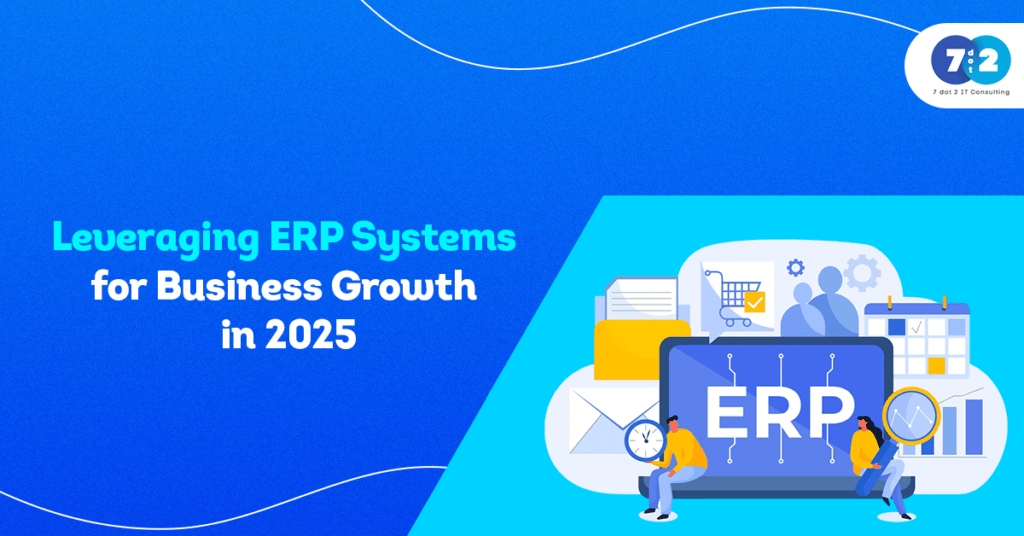Leveraging ERP Systems for Business Growth in 2025
Posted on : 16 November 2024 at 10:31 am, by Puneet Aggarwal, Founder 7 dot 2 IT Consulting

In a world where digital transformation is reshaping industries, enterprise resource planning (ERP) systems have become indispensable for businesses looking to scale and thrive. By streamlining operations, integrating data, and enabling real-time decision-making, ERP systems empower organizations to stay competitive and achieve sustainable growth. As we step into 2025, leveraging ERP systems effectively can be the key to unlocking new levels of efficiency and profitability. Here’s how you can do it.
1. What is an ERP System?
An Enterprise Resource Planning (ERP) system is a suite of integrated software applications designed to manage and automate core business processes, such as finance, supply chain, human resources, manufacturing, and customer relationship management. By providing a centralized platform for data and operations, ERP systems eliminate silos and foster collaboration across departments. Key Features of ERP systems include.
a. Centralized data management.
b. Real-time analytics and reporting.
c. Workflow automation and process optimization.
d. Scalability to accommodate business growth.
e. Integration with third-party applications and tools.
2. Why ERP Systems are Important for Business Growth
Here are a few reasons why ERP systems are important for business growth:
a. Improved Efficiency and Productivity
ERP systems automate routine tasks and standardize processes, reducing manual effort and minimizing errors. This leads to faster operations, increased accuracy, and improved overall productivity.
b. Enhanced Decision-Making
With real-time data analytics and customizable dashboards, ERP systems provide actionable insights into key performance metrics. This enables leaders to make informed decisions and respond swiftly to market changes.
c. Cost Reduction
By streamlining processes and optimizing resource utilization, ERP systems help reduce operational costs. Automation further eliminates redundancies, saving time and money.
d. Scalability and Flexibility
Modern ERP systems are designed to scale with your business. Whether you’re expanding into new markets or introducing new products, ERP solutions adapt to your changing needs without requiring significant overhauls.
e. Better Customer Experience
With integrated CRM modules, ERP systems provide a 360-degree view of customer interactions. This helps businesses deliver personalized experiences, enhance customer satisfaction, and build loyalty.
3. Key ERP Trends to Watch in 2025
Key ERP trends to watch in 2025 include:
a. Cloud-Based ERP Solutions
Cloud ERP systems are becoming the norm due to their cost-effectiveness, ease of implementation, and scalability. Businesses can access data anytime, anywhere, enabling remote work and global collaboration.
b. Artificial Intelligence and Machine Learning
AI-powered ERP systems are revolutionizing business operations by automating complex tasks, predicting trends, and providing intelligent recommendations.
c. Industry-Specific ERP Solutions
To cater to niche markets, ERP vendors are offering tailored solutions with features specific to industries like healthcare, retail, and manufacturing.
d. Integration with IoT
The Internet of Things (IoT) is enhancing ERP systems by providing real-time data from connected devices, improving supply chain visibility and asset management.
e. Focus on Data Security
As cyber threats grow, ERP providers are prioritizing robust security measures, including encryption, multi-factor authentication, and compliance with data protection regulations.
4. Steps to Leverage ERP Systems for Growth
Here’s how you can effectively leverage ERP systems for growth:
a. Define Clear Objectives
Identify your business goals and challenges. Whether you aim to improve supply chain efficiency or enhance customer service, having clear objectives will guide your ERP strategy.
b. Choose the Right ERP Solution
Evaluate ERP systems based on your industry, business size, and specific requirements. Popular options include SAP S/4HANA, Oracle NetSuite, and Microsoft Dynamics 365.
c. Ensure Proper Implementation
A successful ERP implementation requires careful planning, data migration, and employee training. Collaborate with experienced vendors or consultants to ensure a smooth rollout.
d. Encourage Employee Adoption
Educate and train your employees on how to use the ERP system effectively. Highlight its benefits to gain their buy-in and maximize its potential.
e. Continuously Monitor and Optimize
Regularly evaluate your ERP system’s performance and update it to align with changing business needs. Leverage analytics to identify areas for improvement.
5. Challenges in Implementing ERP Systems
Here are some key challenges in implementing ERP systems and ways to tackle them:
a. High Initial Costs
While ERP systems are a long-term investment, their upfront costs can be significant. Businesses should assess ROI carefully before implementation.
b. Resistance to Change
Employees may resist adopting a new system. Address their concerns and provide comprehensive training to ease the transition.
c. Integration Issues
Integrating ERP systems with existing applications can be complex. Partner with vendors who offer robust support and seamless integration.
d. Data Migration Risks
Migrating data to an ERP system involves risks like data loss or inaccuracies. Conduct thorough testing and backups during the process.
Conclusion
As we move into 2025, leveraging ERP systems is no longer optional for businesses aiming to achieve sustained growth and competitiveness. From automating workflows to providing actionable insights, ERP solutions are at the heart of digital transformation. However, to unlock their full potential, organizations must adopt the right strategies, invest in employee training, and continuously optimize their ERP systems.
By embracing ERP systems, businesses can streamline their operations, enhance decision-making, and create a solid foundation for future success. The time to act is now. Leverage the power of ERP to drive your business forward in 2025 and beyond.
